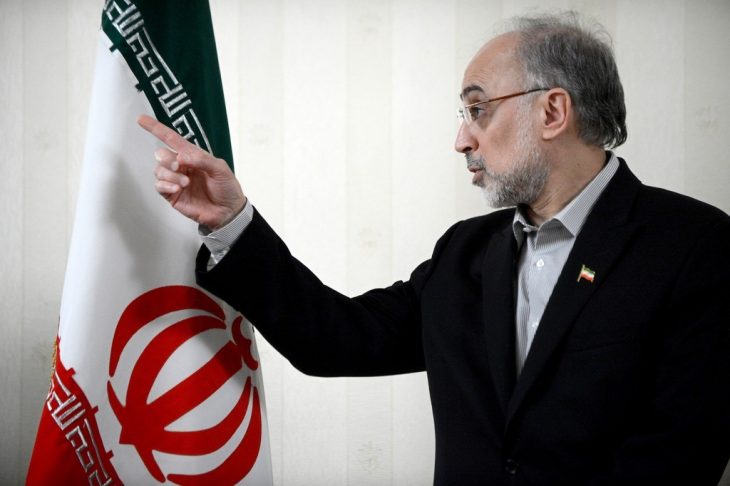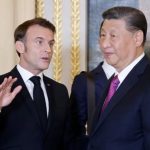Last weekend, while Mike Pompeo was preparing to demand that the Iranian regime abandons all the principles that make it so distinctively obnoxious and dangerous, Miguel Arias Canete, the EU’s Energy Commissioner, was in Tehran.
“We have sent a message to our Iranian friends that as long as they are sticking to the [nuclear] agreement, the Europeans will… fulfill their commitment. And they said the same thing on the other side,” Arias Canete said after meeting Ali Akbar Salehi, who leads Iran’s nuclear program.
Actually, Canete’s Iranian friends said much more. Ali Akbar Salehi, the mullahs’ Dr. Strangelove, threatened ‘all kinds of possibilities’ if the Europeans fail to sustain the Iran deal, including restarting ‘20 per cent enrichment’ of uranium. Behrouz Kamalvandi, spokesman for Iran’s Atomic Energy Organization, added that the Europeans must adopt the necessary ‘mechanisms’ by 8 August, which is when American sanctions are scheduled to resume. Javad Zarif, Iran’s foreign minister, even upped Iran’s price for staying in the deal.
“The EU’s political support for the nuclear deal is not sufficient,” Zarif said on Sunday. “The commitments of the EU to apply the nuclear deal are not compatible with the announcement of probable withdrawal by major European companies.”
European leaders have floated the possibility of passing laws that will permit European companies to evade American sanctions. Ex-officials in the Obama administration have subverted their own government’s position on sanctions, and offered the Europeans support and advice. Meanwhile, Heiko Maas admitted on Sunday that he sees no ‘simple solution’ for protecting European companies from ‘all the risks of American sanctions’. The United States is good at following the money. It taxes Americans globally, and it can make life expensive for European companies that continue to trade with Iran, regardless of whether they do it behind a legal fig leaf from the EU.
European companies are already retreating from their post-2015 deals with Iran. The French oil company Total has said it will abandon plans to invest $4.8 billion in Iran’s energy sector unless the US waives sanctions. Engie, another French energy company, has said it will stop work in Iran before November, when US sanctions are schedule to resume. Deutsche Bank has announced it plans to withdraw from business involving Iran.
Zarif now demands that EU governments make up the shortfall: “The EU must take concrete supplementary steps to increase its investments in Iran.” This is blackmail, economic today and nuclear tomorrow. Perhaps the EU should follow the Obama administration, and send a planeload of cash to Tehran.
The Americans are threatening the Iranians, and the Iranians are threatening the Europeans. This is humiliating for the Europeans, but they seem to be more humiliated by the Americans’ apparent lack of concern for their own feelings. Trump has sided with his allies in the Middle East—Israel, Saudi Arabia, the Gulf monarchies and Egypt—and entirely dismissed the concerns of America’s post-1945 European allies. The Europeans console themselves by dismissing Trump as a vulgarian, but that only makes the reminder of their strategic diminution more painful.
When Trump withdrew the US from the Iran deal, Emmanuel Macron called it ‘a historic moment for Europe’. The dying continent, Macron said, is now ‘in charge of guaranteeing the multilateral order that we created at the end of World War II and which today is sometimes being shaken’. Shaken by the barbarous Americans, that is, not Iran or Russia. So much for the media’s nonsense about the Macron-Trump bromance. The French will never forgive the United States for bailing them out against Germany, twice.
Will France, Britain and Germany really pay the price of guaranteeing the international order? Of course not. They can’t afford it, and they don’t have the military capacity to back it up. The British need American support more than ever; a trade deal with the US is one of the straws at which Britain’s post-Brexit economy must clutch. The EU has no army at all. The Iranian regime is not going to be intimidated by the deployment to its borders of crack units of Belgian parking attendants.
The Europeans might, though, pay the price of their own greed and fear. As with food poisoning, let’s start with the greed, and then move on to the fear. Iran has committed to buy 114 jets from Europe’s Airbus consortium, whose flagship, the double-decker A380, is on life support. In 2016, German exports to Iran rose 26 per cent. In the first ten months of 2016, Britain’s exports rose by 42 per cent. The Europeans are clinging to the Iran deal because, though Germany is doing well, the Eurozone as a whole is not.
And now the fear. In October, 2017 Mohammed Ali Jafari, commander of the Revolutionary Guard, said that Ali Khamanei, the Supreme Leader and had ordered that domestic production of ballistic missiles be limited to missiles with a maximum range of 2,000km (1,240 miles). This, said Jafari, was ‘enough for now’. Enough, that is, for missiles capable of carrying nuclear weapons to threaten Israel, Turkey, Saudi Arabia and the American bases in the Middle East. Enough even to threaten the capitals of Egypt, India and Greece. But not enough to menace the signatories of the JCPOA in London, Paris and Berlin.
For now, anyway. The Iranians claim that another missile, the Soumar, has a range of 3,000 km. That would put Berlin and Moscow within range. Some experts suspect that the Sumac’s range is closer to 2,500 km. So perhaps the Germans don’t need to worry yet. Inhabitants of Rome and the capitals of the EU’s eastern states, though, are within range of the Soumar, which closely resembles Russia’s nuclear-capable Kh-55.
Europe is thousands of miles closer to Iran that the United States. You might think that would concentrate European minds on the strategic danger from Iran’s missile program. But the Europeans have come to expect American protection—as a right reflecting their moral superiority, rather than an accidental dividend of American strategy. This is a symptom of the decline of the European powers, and their failure to pool their remaining strength in the EU. Trump’s withdrawal from the JCPOA merely heightens the tension of what is already a ‘historic moment’ for Europe, and not in the sense that Macron has in mind.
While the US has moved towards energy independence, and even become a net exporter of oil, the EU has headed in the opposite direction. In 2009, a dispute between Russia and Ukraine cut gas supplies to Europe. This year, Germany negotiated a deal with Russia for a pipeline that will send Russian gas under the Baltic to Germany. Iranian exports of oil to the EU have risen since 2015, and EU companies want to exploit Iran’s massive reserves of natural gas.
The Europeans are already sliding away from the American-led global order. Are they really going to compound their weakness by submitting to Iran’s blackmail, and siding with Russia and China over the JCPOA? That really would be a historic moment for Europe, and not one likely to work out well.
It would also be a historic moment for the United States, and a severe blow to the already tottering post-1945 global system. If the United States is committed to confronting Iran—and Pompeo’s terms amount to a call for regime change—then it needs to pull the Europeans back on side. That would directly strengthen America’s position. It would stop the Europeans from further weakening themselves, too.


















